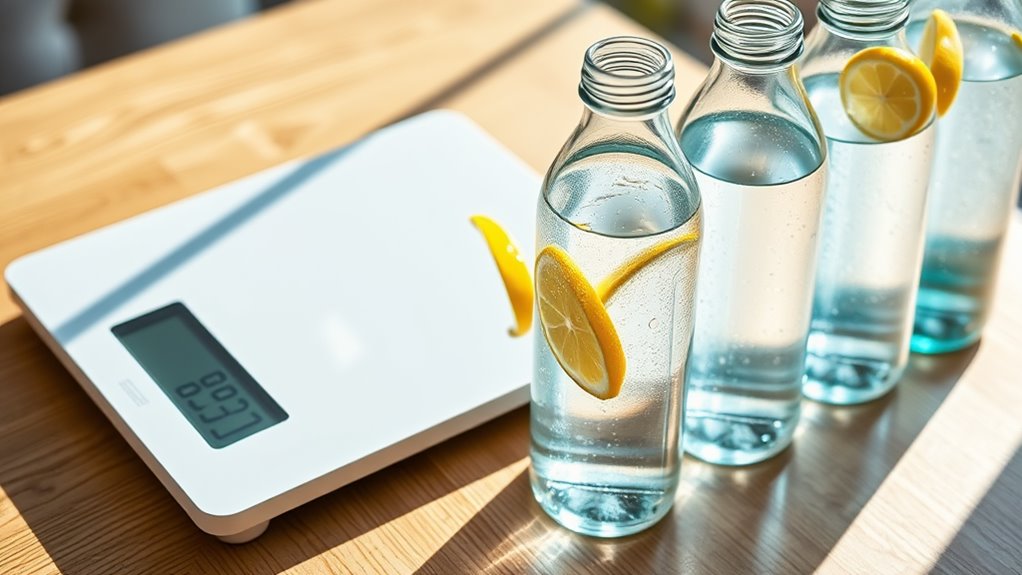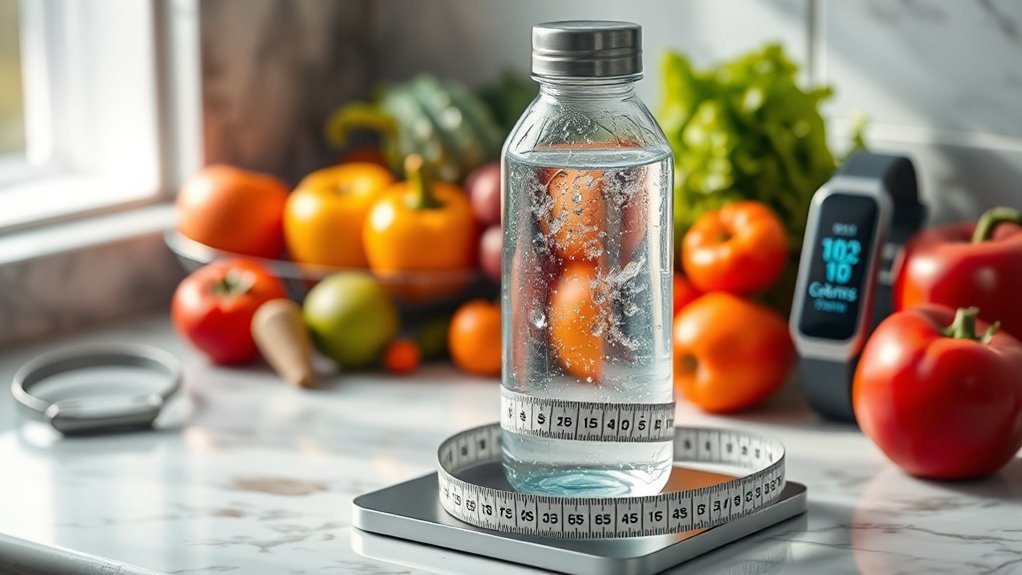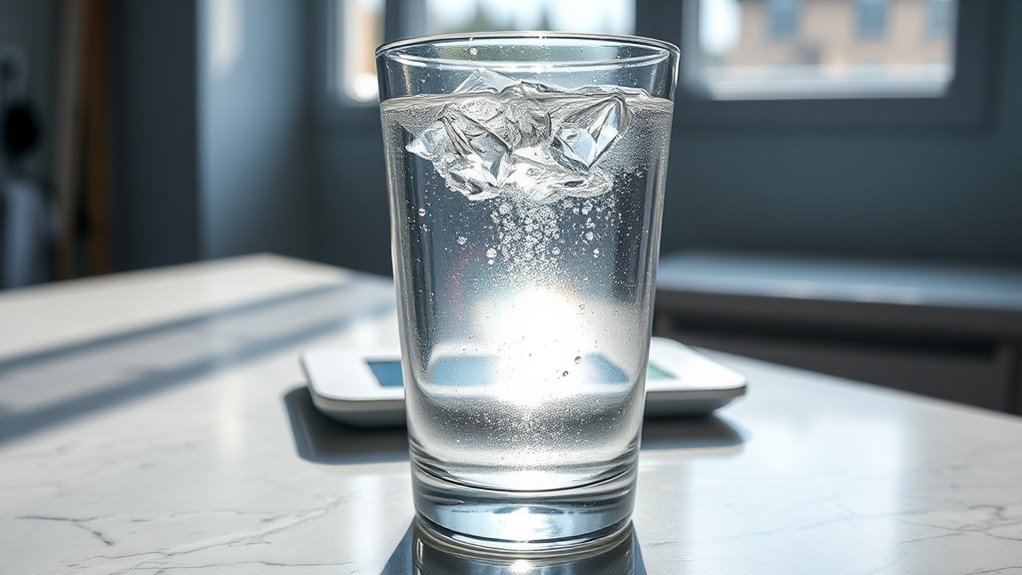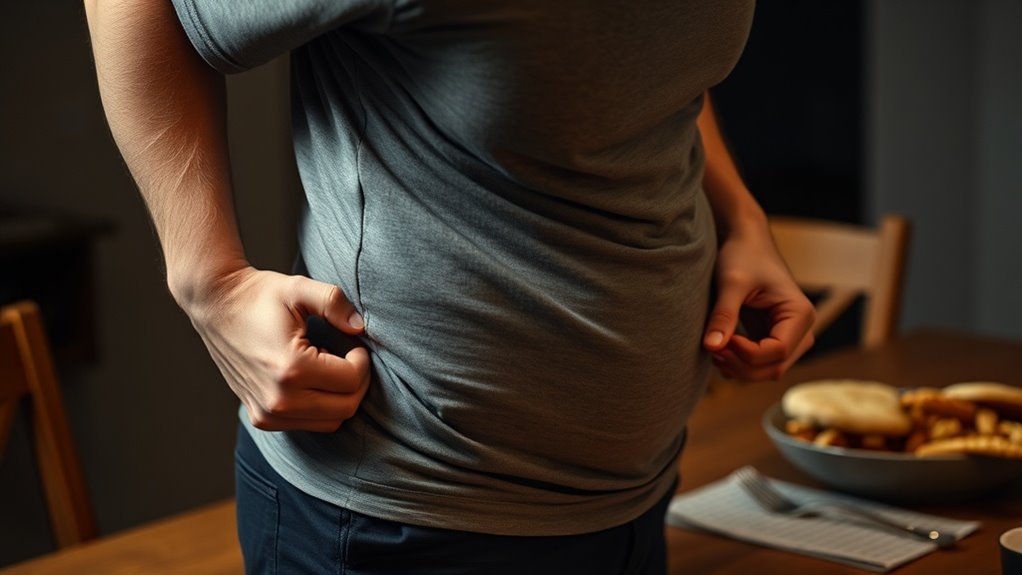How Much Water Do You Really Need to Lose Weight.
Did you know that even mild dehydration can slow your metabolism by up to 3%, making weight loss tougher than it needs to be? You’re likely underestimating water’s role in curbing appetite and burning fat, so stick around to discover how to tailor your intake for real results.
Key Takeaways
- Aim for at least 8-10 glasses (about 2 liters) of water daily to support weight loss and metabolism.
- Increase intake to 2.5-3 liters if moderately active, as it enhances fat burning and energy levels.
- Drinking water before meals curbs appetite, reducing overall calorie consumption for better results.
- Proper hydration prevents dehydration, which slows metabolism and hinders fat loss efforts.
- Track and adjust your daily water intake based on urine color and activity to optimize weight management.
The Role of Hydration in Weight Management
How does hydration influence your weight management efforts?
Hydration for weight loss plays a key role by curbing your appetite and preventing overeating.
When you’re properly hydrated, you distinguish thirst from hunger more effectively, reducing calorie intake during meals.
Studies show that drinking water before eating leads to greater weight loss over time.
You enhance exercise performance and recovery, making workouts more effective for burning fat.
Prioritize consistent water intake—aim for at least eight glasses daily—to support your goals.
Additionally, by replacing sugary drinks with water, you can reduce extra calories, leading to further weight loss.
Understanding Water’s Impact on Metabolism
You know that staying hydrated directly boosts your metabolism, helping your body burn calories more efficiently.
This enhanced energy from water intake keeps you active and focused throughout the day.
Ultimately, it supports fat burning, making weight loss more achievable when you maintain proper hydration.
Additionally, starting your day with water can curb appetite, which helps prevent overeating and supports your weight loss goals.
Hydration Boosts Metabolism
Hydration plays a vital role in boosting your metabolism, as even mild dehydration can hinder calorie burning and energy production.
Studies confirm that adequate water intake enhances your body’s thermogenic response, helping you burn more calories at rest.
For instance, drinking cold water slightly raises your metabolic rate as your body works to warm it.
Make it practical: aim for at least 8 glasses daily, especially before meals, to optimize fat breakdown and support weight loss efforts.
Stay consistent, and you’ll notice improved metabolic efficiency over time.
Consult a professional for personalized advice.
Water Enhances Energy
Water significantly boosts your energy by fine-tuning your metabolism, ensuring efficient nutrient delivery and waste elimination.
Studies show that even mild dehydration slows your metabolic rate, leaving you fatigued and less productive.
You’ll notice improved focus and stamina when you stay hydrated, as water supports cellular energy production and prevents the sluggishness from electrolyte imbalances.
Make it practical: aim for at least eight glasses daily, sipping throughout the day to keep your body performing at its best.
This simple habit enhances your overall vitality, backed by reliable health research.
Fat Burning Effects
Metabolism’s role in fat burning becomes clearer when you consider how hydration influences calorie processing.
Proper water intake optimizes your body’s metabolic rate, as dehydration slows enzyme activity that breaks down fats.
Studies show that even mild dehydration reduces fat oxidation, making it harder for you to burn calories efficiently during exercise or rest.
Stay ahead by drinking enough water—aim for at least half your body weight in ounces daily—to enhance thermogenesis and support weight loss.
Remember, you’re fueling your metabolism; neglect it, and fat loss stalls.
Track your intake for real results.
Recommended Daily Water Intake for Weight Loss
Maintaining an optimal daily water intake is key to supporting weight loss, with experts typically recommending at least eight 8-ounce glasses—about 2 liters—for most adults.
Research shows this level aids metabolism and appetite control, helping you consume fewer calories overall.
You’ll benefit from timing your intake, like drinking before meals to enhance satiety.
Factors such as climate and exercise influence needs; for instance, if you’re moderately active, aim for 2.5 to 3 liters.
Track progress with apps or a journal to ensure consistency and maximize weight loss results.
Additionally, adequate hydration can help maintain energy levels by preventing fatigue associated with insufficient water intake.
Signs of Inadequate Hydration and Its Effects
Ever wonder how inadequate hydration sneaks up on you? You might first notice subtle signs like persistent thirst, dark urine, or unexplained fatigue.
These indicators, backed by health studies, signal your body’s imbalance. Dehydration actively impairs cognitive function, causing headaches and dizziness that disrupt focus.
In weight loss efforts, it reduces metabolic efficiency and amplifies hunger signals, making goals harder to achieve.
Recognizing these effects early, as research emphasizes, helps you maintain optimal health without overlooking vital cues. Stay vigilant for these practical warnings.
To optimize your hydration and support fat-burning, aim for eight glasses of water daily as recommended.
Strategies to Optimize Your Water Consumption
Optimizing your water intake doesn’t have to be complicated; start by setting a personalized daily goal based on factors like your activity level and climate, as studies from the National Academies of Sciences, Engineering, and Medicine recommend.
To make it practical, incorporate water into your routine by carrying a reusable bottle and sipping regularly throughout the day.
Choose plain water over sweetened beverages, as research from the American Journal of Clinical Nutrition shows this reduces calorie intake.
For exercise, hydrate before and during workouts to maintain performance, drawing from evidence in the Journal of the Academy of Nutrition and Dietetics.
Stay consistent for better weight management outcomes.
Additionally, switching to water can help mitigate liquid calories from sugary drinks that contribute to unintended weight gain.
Tracking Progress and Adjusting Water Intake
You’ve got to track your daily water intake using a simple log or app to stay on top of your hydration goals.
Once you’re monitoring, measure progress metrics like weight changes and energy levels to see how water affects your weight loss.
Then, adjust your intake based on these observations and your body’s signals for the best results.
Additionally, proper hydration supports efficient fat burning and overall well-being to optimize your weight loss efforts.
Track Daily Intake
To track your daily water intake effectively, start by logging every glass or bottle you consume using a simple app or journal.
Evidence from health studies shows that consistent tracking boosts adherence, helping you meet hydration goals by up to 25%.
Choose apps like WaterMinder for reminders and quick entries, ensuring accuracy in volume and timing.
Log each drink immediately to avoid forgetting details, as this practice fosters awareness and prevents underestimation.
Make it a habit by integrating it into your routine, like after meals, for reliable data without added complexity.
This approach keeps you informed and on track.
Measure Progress Metrics
Once you’ve tracked your daily water intake, it’s essential to measure progress metrics like weight changes, urine color, and energy levels to fine-tune your hydration strategy.
You monitor weight weekly to spot trends linked to hydration’s role in metabolism, as studies show proper intake aids fat loss.
Check urine color daily; pale yellow signals optimal hydration, while dark hues indicate a deficit, per health guidelines.
Track energy levels through a journal, noting improvements in focus and stamina, which research ties to adequate water consumption.
This data-driven approach ensures you’re on track for weight goals.
Adjust Based on Needs
Based on the metrics you’ve tracked, you adjust your water intake to match your body’s signals and weight loss goals.
Studies indicate that fine-tuning based on thirst, urine color, and energy levels optimizes hydration for fat loss—boost intake if you’re active or dehydrated, reduce if bloating occurs, always prioritizing balance.
- Feel empowered knowing you’re actively nurturing your health, turning data into personal victories.
- Experience the thrill of renewed energy and clearer focus as hydration fuels your transformation.
- Savor the deep satisfaction of achieving sustainable weight loss, honoring your body’s wisdom for lasting well-being.





